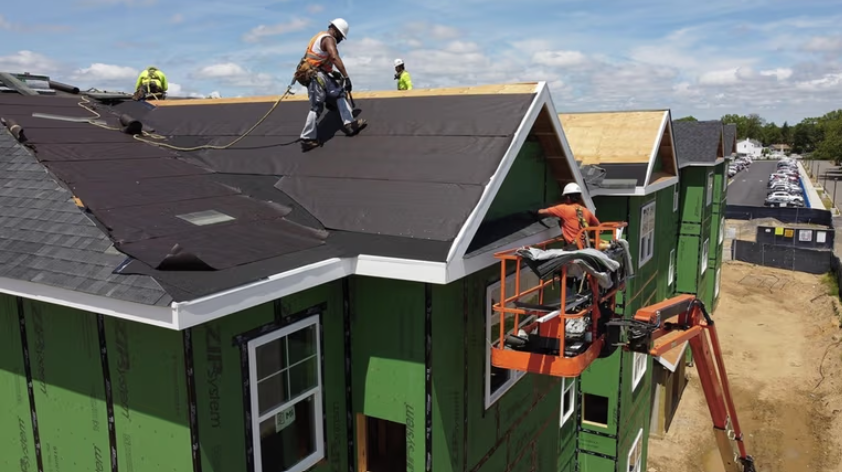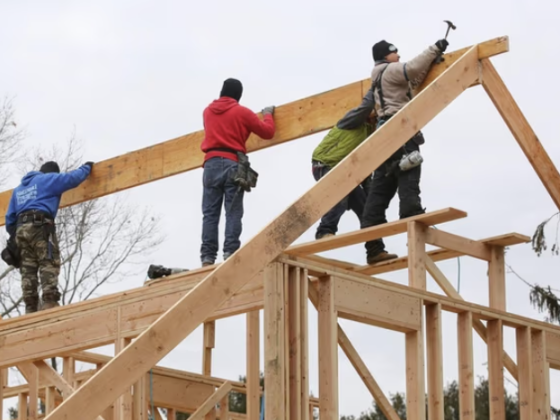By Jonathan LaMantia
President Donald Trump’s new tariffs on imported goods, which went into effect Tuesday, pose a threat to Long Island’s construction industry and could harm the region’s relationship with a key trading partner in Canada, local business leaders said.
The new policies levy a 25% tariff on goods from Mexico and Canada, while the levy on imports from China doubled to 20%. A 10% tariff was imposed on imported oil and gas from Canada. The Trump administration is slated to impose an additional 25% tariff on all imported steel and aluminum starting March 12.
Tariffs on building materials, including steel, lumber and drywall, will increase the cost of construction on Long Island, local experts said. That cost could be passed on to Long Islanders buying new homes or remodeling existing ones as well as businesses building commercial properties.
About $13 billion in construction goods were imported to the United States in 2023, according to the National Association of Home Builders, which notes that is only about 7% of the total cost of materials. However, imports from Mexico and Canada make up a majority of the source of two key materials used in new home construction — softwood lumber and gypsum used in drywall, the group said.
“Tariffs on essential building materials will inevitably drive up the cost of home construction, placing a greater financial burden on both builders and prospective homeowners,” said Mike Florio, CEO of the Long Island Builders Institute in Islandia, which represents home builders and remodelers.
The goal of the tariffs is to protect U.S. national security and punish Canada and Mexico for failing to prevent illegal drugs from crossing into the United States, the White House said this week. The taxes could also encourage companies to turn to products produced in the United States.
“Tariffs are not just about protecting American jobs,” Trump said in an address to a joint session of Congress Tuesday night. “They are about protecting the soul of our country. Tariffs are about making America rich again and making America great again.”
While local projects may cost more, encouraging the use of domestic goods benefits the U.S. economy, said Mark Foster, executive vice president at VRD Contracting in Holbrook, a general contractor involved in public- and private-sector projects.
“We need to support American industry,” Foster said. “We go away from that just because it’s cheaper. It doesn’t mean it’s better.”
But American goods could now face tariffs in foreign markets, which “would lower exports and threaten jobs and economic growth,” said John A. Rizzo, an economist and Stony Brook University professor.
Retaliatory measures
Canadian Prime Minister Justin Trudeau retaliated Tuesday with 25% tariffs on $20.7 billion in U.S. goods. Mexican President Claudia Sheinbaum also said she would respond with tariffs on U.S. goods, Reuters reported Tuesday.
Canada is the largest export market for Long Island companies, according to the Long Island Association, the region’s leading business group. Exports from Nassau and Suffolk counties to Canada were worth $1.5 billion in 2022, according to a report produced by the Consulate General of Canada in New York shared at an LIA event in November 2023.
“The steep increases combined with the threat of retaliatory tariffs will create a perfect storm of economic uncertainty for Long Island businesses, and their price increases will trickle down to consumers, further exacerbating our region’s affordability crisis,” said Matt Cohen, CEO of the Long Island Association, in an emailed statement.
Local real estate developers and general contractors have seen examples of subcontractors retracting quotes and warning of higher prices, said Kyle Strober, executive director of the developers group Association for a Better Long Island. He said construction firms had been stockpiling materials ahead of the measures.
“Developers are faced with uncertainty on what materials will cost, and uncertainty is never beneficial when you’re trying to pencil out the numbers on whether a project is economically viable,” he said.
Tariffs will affect projects differently based on where they are in the development process, said Carl Oliveri, a partner at accounting and advisory firm Grassi in Jericho.
Contractors currently providing estimates may mark up their prices to pass along extra costs, said Oliveri, who advises construction industry executives in the metropolitan area. But for jobs that are further along, companies may need to leverage contract clauses that allow them to charge more because of unforeseen circumstances.
Not all firms will be able to pass along the costs of the tariffs, he said.
“I don’t know if it’s that simple for a contractor to say to an owner, ‘It’s going to cost you 25% more in materials,’ and to still think they’re going to win the job,” Oliveri said.
Peter Florey, principal at affordable housing developer D&F Development Group in Levittown, told Newsday last month that the affordable housing developer had started buying the needed lumber and steel for its projects ahead of the tariffs.
“For projects coming up right now, we’re buying as quickly as we can to try and beat the implementation of measures,” he said.
John T. Costanzo, founder and CEO of the consulting firm LDK Global Logistics in East Norwich, said he’s advising his clients to contact their customs broker about the tariffs’ impact on imports and exports. He said some clients may decide to drop suppliers in Canada, Mexico and China in favor of those in countries where the tariffs are lower.
But Costanzo, who was president of Purolator International, the U.S. subsidiary of the Canadian shipping company, for 18 years, said companies should take a measured approach to shifting their supply chains.
“I don’t think [the new tariffs] are going to last,” he said. “The administration hasn’t really thought out the potential negative effect on the economy. I suspect this will be over sooner rather than later.”
With James T. Madore
Read on Newsday



